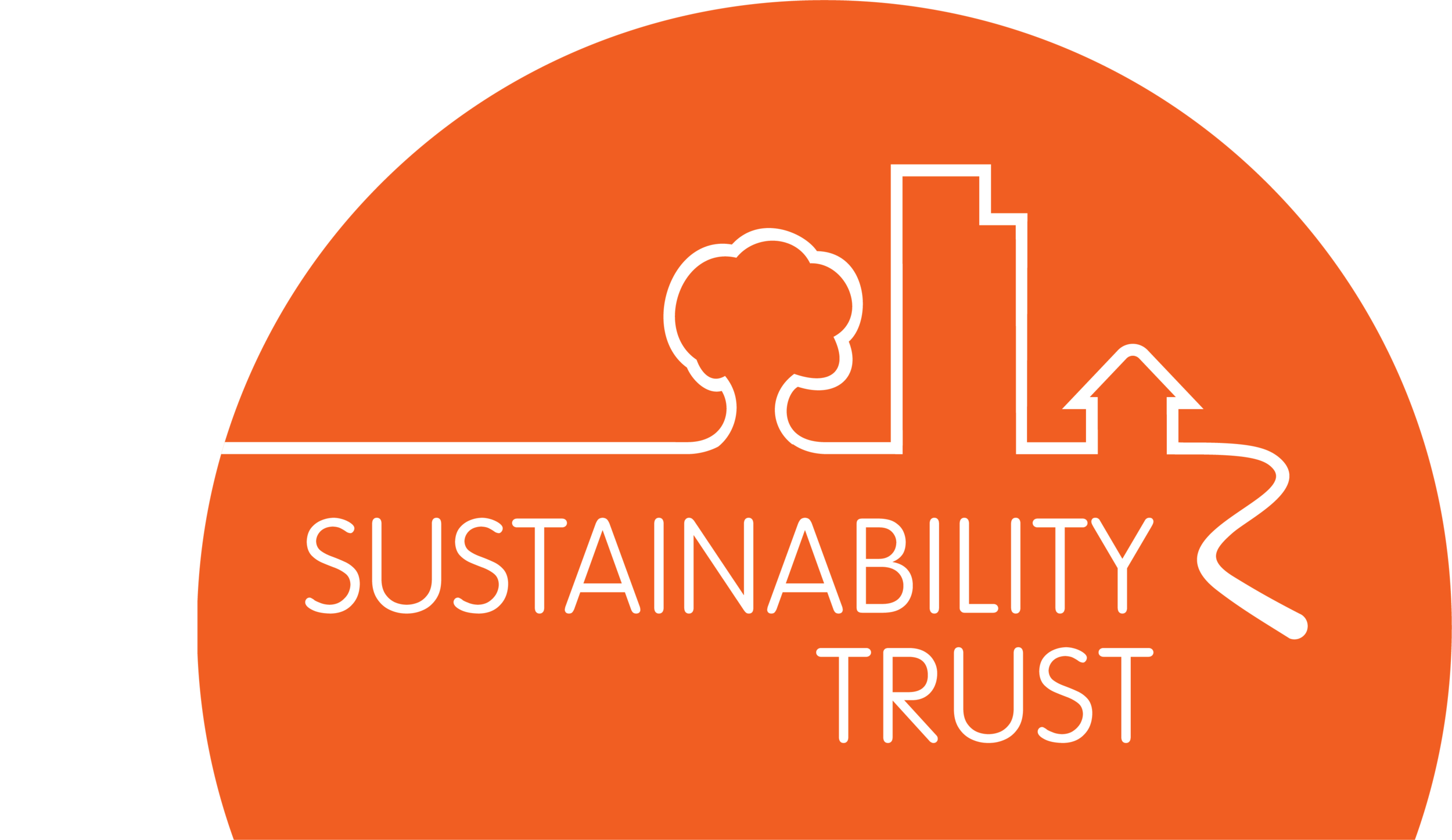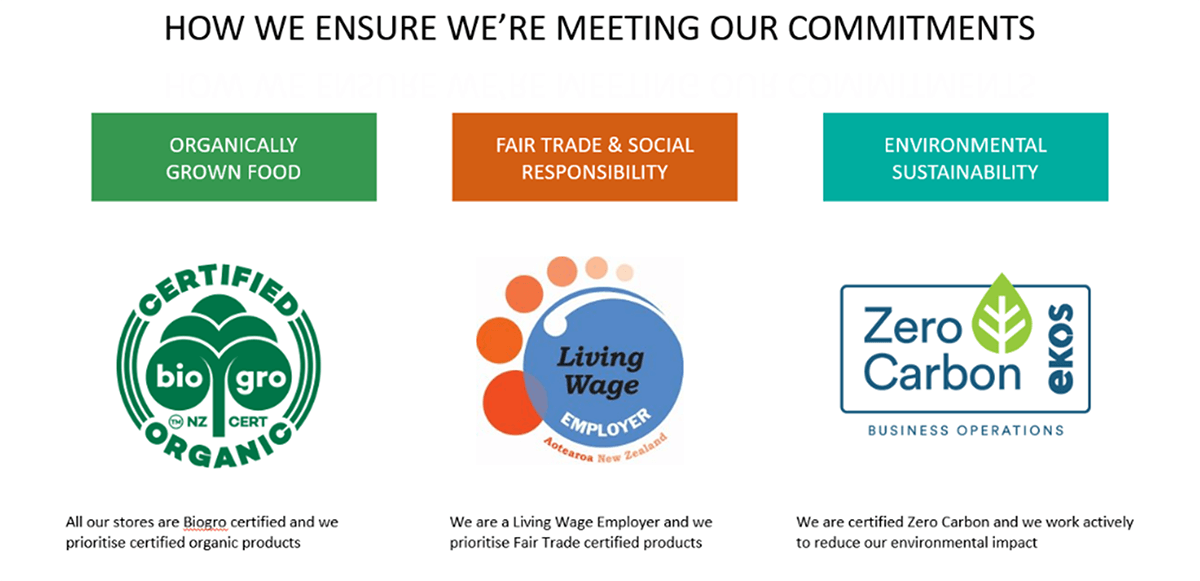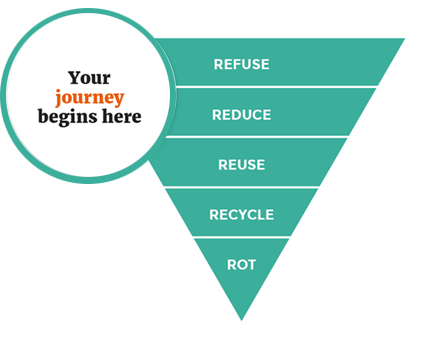Green Team Gatherings 2021
Published 5 May 2021
Our Green Team gatherings
We love bringing like-minded people together. For us it is about sharing knowledge, creating connections, and building community. Our Green Team Gatherings are one of the many ways we do this.
Our gatherings are a series of workshops designed to support and grow the network of workplace sustainability champions in Wellington and each one is themed around a particular sustainability issue.
It’s in the name, Green Team Gathering - a gathering of people who share a passion for creating more sustainable workplaces.
We try to host these events on a quarterly basis. If you would like to join us for our next one – let us know enterprise@sustaintrust.org.nz
Don’t forget to join our LinkedIn Green Team for more great content and resource sharing.
Sustainability Certifications – Thursday, 14 October 2021
Our third Green Team Gathering of 2021 was based around Sustainability Certifications. Sustainability Certifications show independent verification of an organisation’s commitment to sustainability and there are plenty out there, but we wanted to shed some light on what some of the most widely recognised are and what the process is like for getting them. We had three wonderful speakers for the evening who gave us the lowdown on their business’ journeys to getting certified with B Corp, BioGro, Living Wage, and EKOS Zero Carbon.
Audrey Vidoni, Business Development Management for Peoples Coffee, kicked us off with a talk about their B Corp certification, which they have had since 2019.
B Corp stands for Benefit Corporation. It was created as a means of “using business as a force for good”, focusing on people, planet, and profit.
There are 42 certified B Corps in New Zealand, which you can find in this directory. This list includes the likes of Kiwibank, the Co-op Bank, Method Recycling, and Kathmandu.
The B Impact Assessment (BIA) is a free tool designed to help businesses holistically measure their performance and impact across five pillars: workers, environment, customers, community, and governance.
Businesses must score at least 80 (out of a possible 200) to qualify for a B Corp certification. Detailed proof is required for any claims made, such as documentation or photos.
In order to maintain their B Corp certification, a company must update their assessment every three years, which involves providing additional documentation and achieving at least 80 out of 200 points again.
Peoples Coffee decided to go with B Corp because they liked their holistic approach to sustainability and good business ethics. Peoples Coffee has two shops in the Wellington area, as well as a roastery in Newtown. You can peruse their delicious coffee here or read their sustainability report here.
Commonsense is an organisation built on the foundation of organically grown food, fair trade & social responsibility, and environmental sustainability. Commonsense currently has four stores in the Wellington area and one in Auckland, with another on the way. You can shop online or read more about them here. As a values-based organisation, Commonsense wants certifications to guarantee to their customers that they are living in line with their values.
Anna Pitches – the CEO of Commonsense Organics - spoke about their BioGro and Living Wage certifications.
To align with their value of organically grown food, they have been BioGro certified since 2006. BioGro is New Zealand’s largest organic certifier and attaining the certification involves transparency in where an organisation’s products are sourced and accuracy in how they are labelled. Commonsense’s products are estimated to be 60% certified organic (over 2,000 products in total).
To meet their value of fair trade & social responsibility, Commonsense is Living Wage certified. This means they pay all their employees the living wage or above; the living wage is currently $22.75 and has been determined as the minimum hourly wage a worker needs to pay for the necessities of life and participate as an active citizen in the community. This is 14% higher than the current minimum wage in New Zealand. Commonsense is proud to be living wage certified and to model a fair pay system to their community.
Our last speaker for the evening was Jo Morrison, Operations & Compliance Coordinator of Commonsense Organics, who outlined their EKOS zero carbon certification. In order to meet their value of environmental sustainability, Commonsense has been EKOS zero carbon certified since 2014.
To achieve and maintain their zero carbon certification, Commonsense has had to create an emissions inventory each year, send it to a service provider (EKOS), and offset their emissions by carbon credits.
Commonsense’s emissions inventory includes things like travel, electricity use, landfill waste, and employee commute.
With EKOS offsetting carbon emissions by 100% gives an organisation a zero carbon certification, while offsetting 120% or above gives a carbon positive certification. Terminology around certification does vary depending on the provider.
Commonsense think it is in a business’ interests to track emissions as it will eventually be mandated, as it has been for government.
The Ministry for the Environment has emissions factors tables to help calculate carbon, which can be found in this guide.
If you’re keen to learn more about the plethora of sustainability certifications out there, the Sustainable Business Network has an excellent guide here.
The Trust was able to cater this Green Team Gathering waste free with the help of Commonsense catering and using our Reusabowls. Our sustainable drinks were generously donated by Mean Doses and Round Theory Wines. Round Theory Wines are sustainably grown and sourced, and our lightweight packaging (30% less glass used) reduces its environmental impact. We are climate positive and aim to offset at least double the amount of carbon we use, with our carbon credits allocated to conservation and preservation projects worldwide. Our wines have offset enough carbon to drive to the moon and back over 8 times! Great wines, for the greater good.
Sustainability at Home – Thursday, 8 July 2021.
Our second Green Team Gathering of 2021 was on Sustainability at Home – how to reduce your environmental impact while working from home. We think this feedback from one of our attendees sums it up nicely:
“This was a great evening to where I learnt how to improve my home office to be more sustainable and more comfortable. Really encouraging small steps. Great reminder, it's about staying warm, not about the view. Excellent panel of speakers, and useful insights shared by the audience.”
Our three speakers for the evening were:
Brian Johnston - Head of Impact at CoGo, on sustainable purchasing
Rob McGhee - Home Energy Assessor at Sustainability Trust, on energy efficiency
Asia Brownlie – Sustainability Consultant at Sustainability Trust, on waste minimisation
Brian talked about CoGo and their platform for ethical, sustainable purchasing:
CoGo is the largest aggregator of accredited & certified businesses in NZ, UK and soon to be Australia.
They have thousands of independently accredited businesses listed on their platform across 13 sustainability lenses, including ‘Carbon Neutral’, ‘Sustainably Sourced’, and ‘NZ Made’.
The free app is a consumer platform that enables users to track their own personal impact in real-time; you securely link your bank accounts via open banking, select the values that matter the most to you, and see accredited businesses that align with your values. The app then tracks how your spending aligns with your values.
Users can measure how you are tracking against your values, see and be recognised for positive impact, and offset your carbon to improve and build engagement on what you care about.
Why is it important to know your carbon footprint? So, you can start to understand the full impact of your lifestyle, and take action to reduce it.
Rob covered energy efficiency, and how we can use the acronym HIVEMIND to create energy-efficient home offices:
H: Heating. Find out about efficient heating in our handy blog.
I: Insulation. You can learn more about home insulation here.
V: Ventilation. Rob recommended opening your windows for 15 minutes in the morning after you wake up to clear out any moisture.
E: Extraction. Moisture extraction at source is key to reducing condensation and mould growth. You should have extraction fans in bathrooms and kitchens to ensure that steam is extracted. Rental homes are legally required to have these as part of the Healthy Homes Standards.
M: Moisture. Rising damp from wet underfloors is a huge contributor to high indoor humidity. Routing stormwater away from the underfloor and providing a barrier between damp earth and the floorboards is one of the simplest fixes to a damp house. You should also never dry your clothes inside, if you can avoid it! You can measure humidity levels in your home using a hygrometer, or get rid of condensation on your windows using a scoopy.
D: Draught. Uncontrolled draughts rob your home of heat. As per the Healthy Homes Standards, rental homes must have no unnecessary gaps or holes in walls, ceilings, windows, floors, and doors that cause noticeable draughts. You can block door draughts with a nifty door snake.
Asia talked about waste minimisation and the ways we can reduce our different waste streams.
Using the top three ‘R’s of the waste hierarchy below – refuse, reduce, & reuse – to avoid creating waste in the first place.
Refuse: refuse to order things like takeout or online shopping, to avoid all the packaging waste that comes with it.
Reduce: minimise the amount of things you use or consume, such as printing less if it’s not absolutely necessary.
Reuse: favour reusable products like drink bottles and keep cups over the disposable kind, and think of creative ways to repurpose other items - i.e. use old clothes for rags and toilet rolls for planting seedlings.
If something does come to the end of the life, double-check whether it can be recycled – some items might not be able to be put in your kerbside recycling but could be dropped off for specialist recycling. Sustainability Trust accepts a number of niche items for recycling, including bottle caps, e-waste, batteries, oral care items, and writing instruments (pens, etc). You can read more about our recycling programmes here.
Food waste: food waste that ends up in landfills produces methane, a potent greenhouse gas. To avoid this, there are a number of different composting options you can use at home:
Traditional compost: think the classic big black bin. Reasonably easy, although lots of us are guilty of not introducing enough carbons (cardboard, wood chip etc) and just have a bit of a rotting pile! You also need to make sure to rat-proof your compost so you’re not attracting pests.
Bokashi bins: accepts all food and works by pickling your food waste in a bucket. They can be kept inside if you keep it clean, however, you do still need somewhere to bury the pickled stuff so it can finish composting!
Worm farm: worm farms are the fussiest, but you get fantastic compost and worm tea to use in your garden. Worms don’t like to be too dry or too wet, and we recommend avoiding citrus, oils, and meat or dairy. Worm farms can be a really fun way for kids to learn about composting cycles.
Sustainable Procurement recap – Thursday, 29 April 2021.
Our first Green Team Gathering of 2021 was an enormous success! We think this feedback from one of our attendees sums it up perfectly:
“A great event on so many levels: yum food & drink, interesting speakers, cool takeaways, awesome networking and some good learnings. Thanks so much, can’t wait for the next one!”
At this Green Team Gathering, we looked at Sustainable Procurement. Our excellent speakers for the evening were:
Alice Bray - Senior Procurement Advisor at Waka Kotahi/NZTA and winner of the Young Talent award at the CIPS Australasia Supply Chain Management Awards 2020
Holly Norton - Senior Project and Partnership Manager at SBN and leader of SBN’s Sustainable Procurement Leaders Group.
Alice covered government procurement and what the broader outcomes programme means for practitioners in the market. Some of the key takeaways from her presentation were:
The definition of broader outcomes: “The pursuit of secondary benefits including social, cultural, environmental, and economic outcomes that are generated by the way goods, services or works are procured or delivered.”
Examples of broader outcomes: social outcomes, ethical supply chains, environment, and social governance, etc.
Society, government, policy, procurement, and practitioner are all dynamics in play in pursuing sustainable procurement; all players are interconnected and can influence one another.
The three things needed to be successful in pursuing sustainable procurement: patience, knowing your organisation’s values, and networking.
Holly covered the Sustainable Procurement Leaders Group (SPLG) and provided attendees with an excellent framework for incorporating sustainability into the procurement lifecycle. Some of the key takeaways from her presentation were:
What is best practice? SPLG broadly agreed that best practice means “integrating sustainability across each stage of the procurement life cycle,” however they did not attempt to lock in a single definition as organisations have different values, sustainability targets, products, services, and priorities.
As purchasers we have a responsibility to not only commit to best practice ourselves, but to commit to helping our suppliers achieve it too. If we are buying it, then it’s our responsibility!
The seven steps of sustainable procurement policy and strategy are (refer to diagram below)
The diagram is based on ECO-Buy’s Quick Guide to BS 8903 for Procuring Sustainably and featured in an earlier SBN procurement resource.
After Alice and Holly spoke, we broke into some discussions groups to chat about the barriers to sustainable procurement in our workplaces and what overcoming those barriers could like.
Common barriers that cropped up in the groups were:
getting senior-level buy in
cost
lack of knowledge.
Some of the solutions that our groups came up with were:
creating business cases to get buy in and counter cost arguments
bringing in experts to educate staff networking for knowledge-sharing and support.








